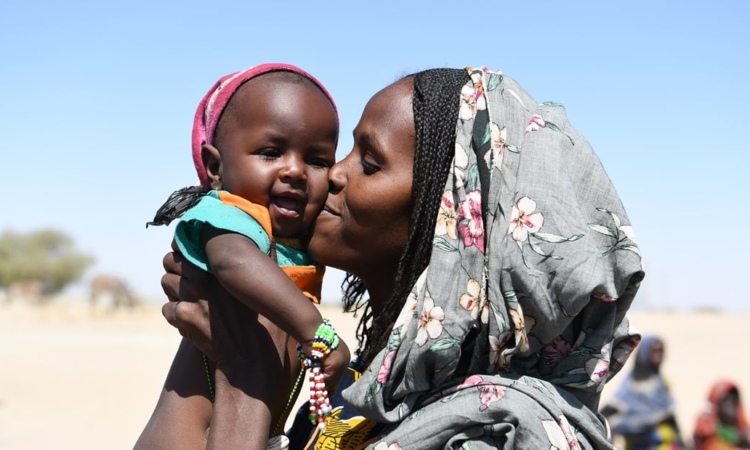Staggering backsliding across women's, children's and adolescents' health revealed in new UN analysis – World Health Organization (WHO)

A new UN report shows that women’s and children’s health has suffered globally, as the impacts of conflict, the COVID-19 pandemic and climate change converge with devastating effects on prospects for children, young people and women.
Data presented in the report show a critical regression across virtually every major measure of childhood well-being, and many key indicators of the Sustainable Development Goals (SDGs). Since the last Every Woman Every Child Progress Report published in 2020, food insecurity, hunger, child marriage, risks from intimate partner violence, and adolescent depression and anxiety have all increased.
An estimated 25 million children were un- or under-vaccinated in 2021 – 6 million more than in 2019 – increasing their risk of contracting deadly and debilitating diseases. Millions of children missed out on school during the pandemic, many for more than a year, while approximately 80% of children in 104 countries and territories experienced learning-loss because of school closures. Since the start of the global pandemic, 10.5 million children lost a parent or caregiver to COVID-19.
“At the core of our unkept promise is the failure to address the gaping inequities at the root of global crises, from the COVID-19 pandemic to conflicts and the climate emergency. The report describes the impacts of these crises on women, children and adolescents, from maternal mortality to education losses to severe malnutrition,” said Antonio Guterres, United Nations Secretary-General.
The report provides wide-ranging evidence that children and adolescents face wildly divergent chances of leading a healthy life simply based on where they are born, their exposure to conflict, and the economic circumstances of their families. For example:
The report calls upon the global community to address this damaging trajectory and protect the promises made to women, children, and adolescents in the Sustainable Development Goals. In particular, it advocates for countries to continue investing in health services, to address all crises and food insecurity, and empower women and young people around the world.
The report, titled Protect the Promise, is published by global partners, including WHO, UNICEF, UNFPA, Partnership for Maternal, Newborn & Child Health (PMNCH) and Countdown to 2030, as a bi-annual summary of progress in response to the UN Secretary General’s Every Woman Every Child Global Strategy for Women, Children’s and Adolescents’ Health. The most comprehensive synthesis of evidence on the current state of maternal, newborn, child and adolescent health, it updates the last Every Woman Every Child Global Strategy Progress Report published in 2020.
Quote sheet:
“Almost three years on from the onset of COVID-19, the pandemic’s long-term impact on the health and well-being of women, children and adolescents is becoming evident: their chances for healthy and productive lives have declined sharply,” said Dr Tedros Adhanom Ghebreyesus, WHO Director-General. “As the world emerges from the pandemic, protecting and promoting the health of women, children and young people is essential for supporting and sustaining the global recovery.”
“The impacts of COVID-19, conflicts, and climate crises have raised the stakes for vulnerable communities, revealing the weaknesses and inequities in health care systems and reversing hard-won progress for women, children, and adolescents – but we are not powerless to change this,” said UNICEF Executive Catherine Russell. “By investing in resilient, inclusive primary health care systems, jumpstarting routine immunization programmes, and strengthening the health workforce, we can make sure that every woman and every child can access the care they need to survive and thrive.”
“There is a crisis of inequity that is piling on already increasing and compounding threats. In a world where too many children, adolescents and women are dying, equity, empowerment and access are what needs urgent focus,” said H.E. Ms. Kersti Kaljulaid, Global Advocate for Every Woman Every Child and President of the Republic of Estonia, 2016-2021. “We are calling on all to think and act broadly and profoundly to protect the promise. This promise refers not only to the commitments made in the Sustainable Development Goals, and all of the campaigns that followed, but also to the larger promise of potential that everyone is born with. Too often this promise remains unclaimed, or even denied.”
“In the face of increasing political pushback against sexual and reproductive health and rights in many countries, women, children and adolescents today are left without many of the protections of just a decade ago, and many others still have not seen the progress they need,” said Dr. Natalia Kanem, UNFPA Executive Director. “Access to sexual and reproductive health services, including contraception, is a fundamental right that directly and acutely affects the ability of women and adolescent girls to thrive. We need to expand these rights and services to the most marginalized, leaving no one behind.”
“The report advocates for countries to continue investing in health services, in all crises, and to re-imagine health systems that can truly reach every woman, child, and adolescent, no matter who they are or where they live,” said the Rt. Hon Helen Clark, Board Chair of PMNCH (The Partnership for Maternal, Newborn & Child Health) and former Prime Minister of New Zealand. “Experts and world leaders are calling for more women in policy- and decision-making at every level, meaningful engagement with young people, and primary health care systems which deliver what people need when and where they need it most.”
###
Notes to editor:
Download multimedia content here
Access infographics and data here
The report will be launched at the World Health Summit in Berlin on 18 October 2022 at 9 AM GMT+2 at a session where the findings will be discussed by world leaders and young people. The session can be joined in person or virtually.
Media Contacts
Laura Keenan
Communications officer
World Health Organization
Mijail Santos
PMNCH
Cathy Bartley
PMNCH
Sara Alhattab
UNICEF
Natalie Bailey
EWEC
Rebecca Zerzan
UNFPA
Related
Fact sheets







